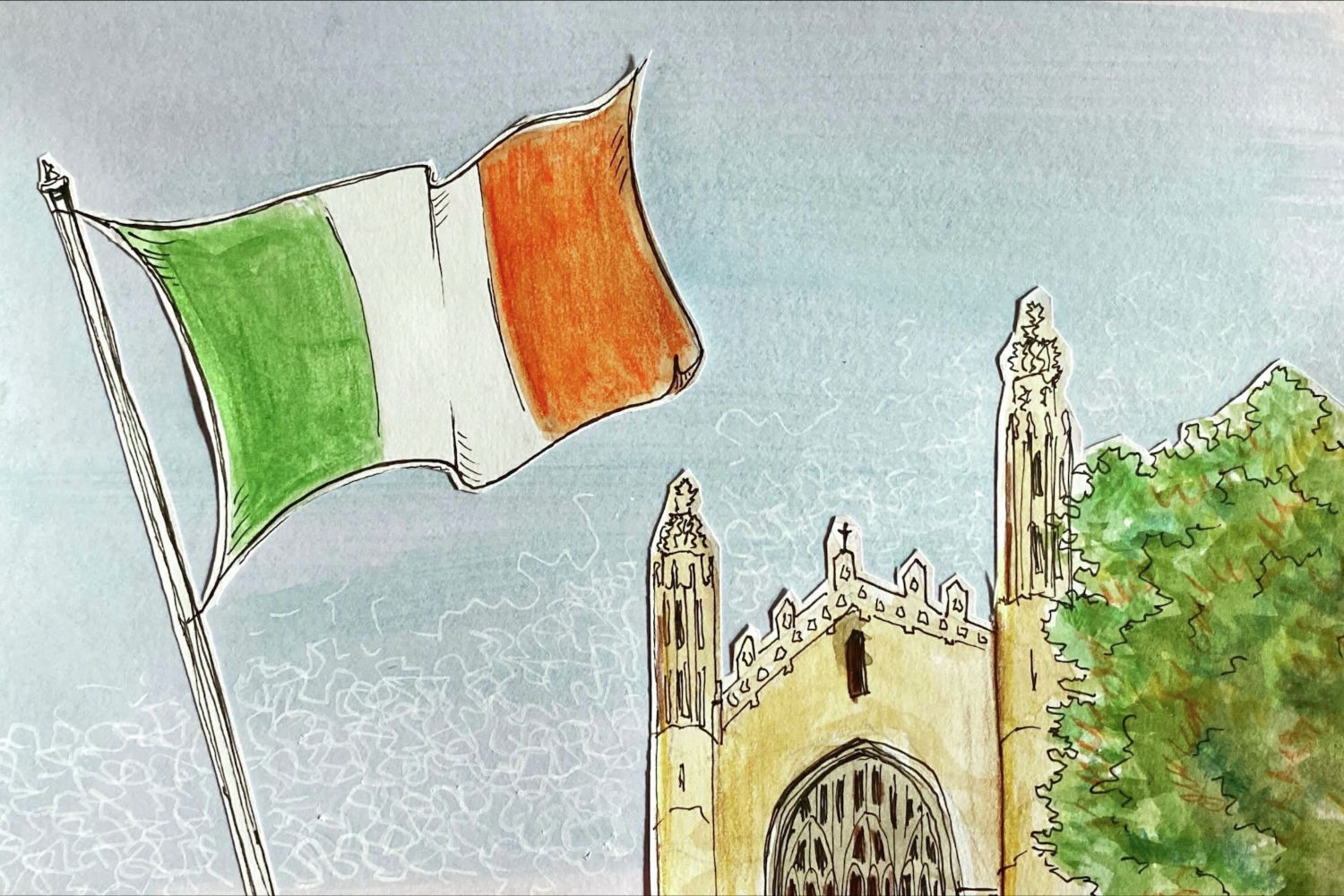The night before I left home, I played Sammy Copley’s ‘Irish Goodbye’, a song that epitomises the experience of many Irish young people. His beautiful cadence lulls us into a sense of melancholy, as he sings that “leaving’s in my bones;” that Ireland is a “place where good things learn to die”. In leaving for Cambridge, I felt seen in these words. It felt necessary for me to escape Ireland, but leaving also came laced with a deep sense of guilt. Watching the green fields of home fade from the aeroplane window, I felt as if I had betrayed my country.
Statistics show that Irish students continue to make up a miniscule proportion of the university population. In 2020, only 34 students from both Northern Ireland and the Republic were admitted. Feelings of betrayal and a potential fear of leaving one’s home country seem to contribute to the reluctance of many Irish students to attend a British university, including Cambridge.
“It felt necessary for me to escape Ireland, but leaving also came laced with a deep sense of guilt”
For many Irish students, there is a sense that we are primed for feelings of guilt through the concept of “notions”. Clodagh, a Dubliner currently in the process of getting her PhD in psychology, defines “notions” as the point at which the people around you decide they have to “knock you down a peg” from what they perceive as you getting too big for your boots. Clodagh hid her plans to apply from acquaintances, and felt a palpable hostility from schoolmates. She suggests that you are branded with “notions” when it becomes “very obvious that you see yourself differently to people around you”.
Sophie Keane, a 2nd year HSPS student at Corpus Christi College, agrees with this. She’s from County Down in Northern Ireland, and adds that people at home can be quite belittling. She is told not to “become English” while she is away, suggesting that her identity will be subject to erosion from those around her. Returning to Ireland is not something she necessarily sees in her future, and thus the worry that a gulf will open up between herself and her Irishness is powerful.
Dearbhla, a History and Politics undergraduate from Belfast, doesn’t worry about this, particularly as she plans to return home after she graduates. But this doesn’t prevent her from experiencing discomfort and anger. She outlines how those around her tend to operate with a distinct lack of awareness about Irish history and Anglo-Irish relations in general. At dinners where others around her have made toasts to the King, she is often greeted with “an odd look” when she doesn’t participate.
“Dearbhla outlines how those around her tend to operate with a distinct lack of awareness about Irish history and Anglo-Irish relations in general”
She suggests that this lack of awareness is the result of an orchestrated attempt to withhold adequate education on the UK’s colonial past from young Britons. British people are not necessarily unwilling to learn about their country’s history, she believes, but opportunities to learn are often not available precisely because the British government knows “to put it lightly, [that] they messed up when it came to Ireland.”
This contrasts directly with the constant awareness experienced by Irish students like Sophie. For her it is Cambridge’s historical “links to the English officer […] and parliamentarian class” which creates the most significant tension. Growing up in a post-conflict, post-Troubles Northern Ireland has given Sophie a “viscerally present sense” of the continued colonial legacy of the British in Northern Ireland, further exacerbating feelings of “guilt and betrayal”. She says that the continued economic and social instability in her home has maintained a “brain-drain mode,” where “most young people” she knows “go to Australia, Canada, and don’t come back”.
Sophie is not sure she’ll go back home, particularly as she’s interested in pursuing a career in academia, and it is perhaps this awareness of leaving Ireland behind that contributes to her discomfort. She describes to me her love of Gaelic Football in particular, and her participation in the Gaelic Athletics Association (GAA), a central institution in Irish culture on both sides of the border. However, leaving her home behind has forced her to ask herself whether she “really love[s Ireland] if [she’s] willing to leave it”.
This is an experience shared by many Irish people who emigrate, but is worsened by attending Cambridge. Sophie suggests that it is more socially acceptable to emigrate to cities like Liverpool and Manchester. There are at least three GAA clubs there, and much more established Irish communities. Sidney Sussex College, by contrast, is the alma mater of Oliver Cromwell.
For British people, Cromwell is perhaps most strongly associated with his tenure in Parliamentarian forces during the English Civil Wars and his role as Lord Protector of the Commonwealth of England, Scotland and Ireland from 1653 until 1658. In Ireland, however, Cromwell is a hated figure, to the extent that his name is often utilised as a stand-in for general anti-Irish violence and colonialism in literature and nationalist songs. He is remembered not for his contribution to British democracy, but for his genocidal rampage across Ireland in an attempt to quell royalist forces and place Ireland completely under British control. His war is known in Ireland as ‘an cogadh a chríochnaigh Éire’ – the war that finished Ireland. However, on Sidney Sussex’s own website, as well as other Cambridge-related websites, this legacy is nowhere to be seen.
“Although all my interviewees expressed anger, they also saw their very presence here as a subversion of colonialist narratives”
This continued ignorance might be expected to contribute to a feeling of complete disconnection, but for all of my interviewees, this is not necessarily the case. Although all three expressed anger, they also saw their very presence here as a subversion of colonialist narratives, a “Fuck you Cromwell,” if you will. Dearbhla describes the “spike of pleasure” she gets from “sitting in Sidney Sussex bar drinking their […] Sex on the Cam,” knowing that “Cromwell would be rolling in his grave”. Although she understands why some Irish people might see this as hypocrisy, she argues that what the “rebels were fighting for” was “equality” and that “us being here kind of proves […] that we are reaching that point of equality”.
The Irish Society said that: “Cambridge has not yet adequately addressed its history of colonialism within Ireland, such as by fully acknowledging the atrocities committed by figures associated with the university like Oliver Cromwell.” The society seeks to facilitate the continued engagement of students in Cambridge who “live on the island of Ireland or are of Irish descent,” through “ensuring [the university] feels both accessible and inclusive to all Irish students”.
For all of the Irish students I spoke to, identity is inherently fluid. They have to strike a balance between their strong Irish identity, and living in a place with a history of perpetrators in Ireland’s traumatic past. For some, this creates a disconnect with home, a feeling of guilt. For others, there is a sense of defiance. For some, returning home is not an option. For others, it is the only one.

Caerdydd to Caergrawnt: what is it to ‘be Welsh’ in a home away from home?
Dearbhla described walking into a “random pub” in Belfast on “a random Tuesday at 8pm,” expecting it to be dead. Instead, “there was music blasting, the place was packed, I got a Guinness and I immediately split the G and I just went, that’s it, I’m never leaving the country, I will die here.”
Names have been changed for privacy reasons.

